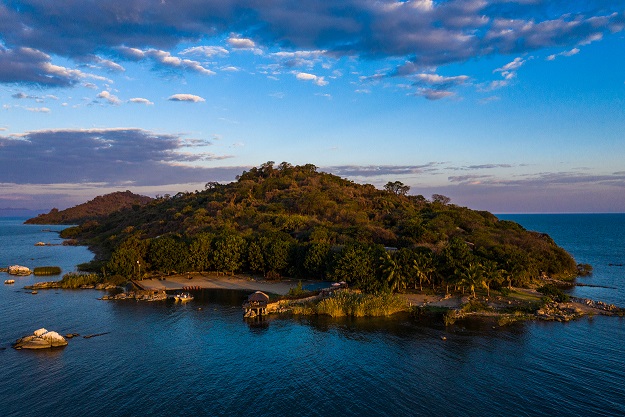Conservation Project
Eco Lodge
120km from Lilongwe, Nankoma Island, Malawi
-13.9022222, 34.62694444


Blue Zebra Island Lodge is situated on the Nankoma Island, Lake Malawi National Park, and accessible via a 20 minute boat ride from Senga Bay boat collection. It is a conservation driven lodge offering a unique and sustainable travel experience, located in the world’s first freshwater national park. With boundaries established in 1980 under the National Parks and Wildlife Act, UNESCO declared Lake Malawi National Park a World Heritage Site in 1984, recognizing the significance of Cichlid fish as an example of biological evolution.
The Department of National Parks and Wildlife (DNPW) in Malawi introduced wildlife concessions for designated areas across the country as means to achieving conservation through sustainable wildlife resource utilisation. Strategic tourism management plans were designed to aid protection of various parks.
We acquired the wildlife concession for the Marelli islands, operating under Waterlands Ltd in 2011. Blue Zebra Island Lodge - named after a colourful Cichlid (fish) - officially opened to guests in October 2013, following a long process of intricate design and construction to create an unobtrusive and eco-friendly lodge on wild Nankoma Island. Working with the DNPW under protection of Lake Malawi National Park, we aim to preserve ecosystems of the Marelli Archipelago.
Conservation Highlights:
- Protection of Cichlids: many of which are vulnerable or endangered. While hundreds of Cichlids are endemic to Lake Malawi, there are also Cichlids endemic to the Marelli Islands themselves. Overfishing and illegal poaching in Lake Malawi is a huge challenge. Fishing within 100m of the islands is illegal. This protection allows natural breeding zones.
- Protection of fauna and flora: many species of fish, birds, otters, reptiles, small antelope, ancient fig trees, giant baobabs and much more. Conservation of the island’s flora includes a seedling and reforestation project.
- Solarisation: September 2020, in a major step towards a greener lodge, Blue Zebra commissioned a solar system. The solar system replaces a generator that required 12 000 litres of fuel/year, a major reduction in the lodge’s carbon footprint. Blue Zebra is now able to provide uninterrupted power for 24 hours/day.
- Nature trails: in promoting ecotourism, unobtrusive nature trails on Nankoma Island allow guests to explore and learn about flora & fauna with information signs along the trails. In October 2020, we began nature trails on Maleri island. The trails will provide access to some spectacular vegetation, landscapes and views. This project is a GIZ initiative to provide work to 20+ people whose tourism industry dependent livelihoods have been affected by the Covid pandemic.
- Community collaboration: through DNPW, working with communities to raise awareness of overfishing in Malawi, creating jobs in hospitality, training and upskilling.
Future Aims:
- Restocking of game: the DNPW has studied the islands’ ecology and has identified species that the islands can sustain. These include duiker, bushbuck, dik-dik and klipspringer to name a few. In partnership with the DNPW, antelopes have been released and have settled into their new surrounding and will offer those who explore the islands the chance of an encounter.
- National Parks Field Camp: a permanent base for LMNP rangers will be completed by year-end enabling full time protection of the islands. This is also being made possible with the assistance of GIZ and will provide a source of income to a further 10+ individuals who have been adversely affected by the global pandemic.
- Expand community projects: develop a more structured plan supporting local schools on the mainland, with a focus on education about conservation in Malawi. Educational trips for schools: for children to learn about our conservation initiatives first hand.
- Bird database: to expand our species list and get a better understanding of the year-round and migratory birds of the islands. In 2019, we had our first African Pitta sighting, with a pair nesting on Nankoma Island.
- Tree identification and labelling: to create a database of trees on the island and make signs to go next to some of the trees along trails.